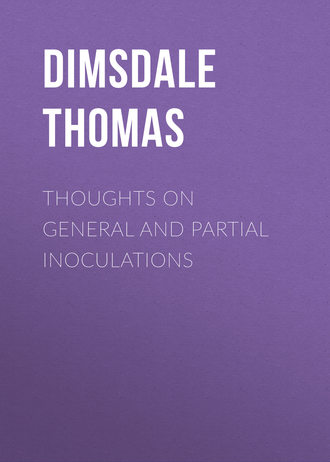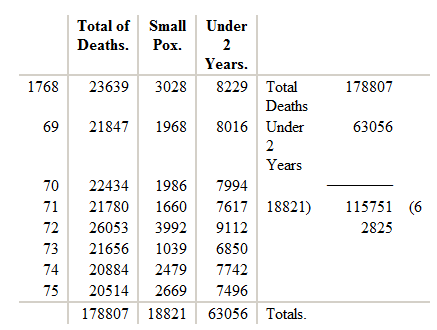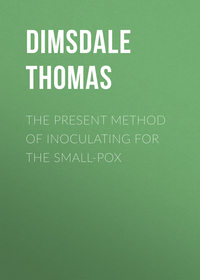 полная версия
полная версияThoughts on General and Partial Inoculations
That for preparing the patients for inoculation at Pancras contains 100 beds; and that for receiving them when the disease appears, and for admitting those who are seized with the Small Pox in the natural way, in Cold Bath Fields, 130 beds.
All who are destitute of friends or money and are attacked with this disease, or are desirous of being inoculated, if seven years old or upwards, are proper objects of this charity.
Patients in the natural way are received every day, if there is room for them; and to prevent the danger and expence of a disappointment, enquiry should be first made. Patients for Inoculation are also received every day at Pancras before nine in the morning.
Strangers are forbid to visit the patients.
Cloaths are provided for the patients, while their own cloaths are freed from infection before their discharge.
As the first outline of every attempt towards a new institution has for the most part been imperfect, it is not to be wondered at if the plan and regulations of these Hospitals should admit of improvements; and the following remarks will perhaps point out some regulations that deserve attention.
It is now near thirty years since the first establishment of this charity; at which time it was the received opinion that a strict regimen ought to be observed, and a course of medicine complied with, by way of preparing the most healthy previous to their Inoculation. It was also believed, that there was some risque of taking the natural infection injuriously at the time of being inoculated, and danger of accumulation by residing with others who had the disease; and the inoculators of that time who made use of infected thread and lint, sometimes failed infecting on the first trial, and in such case the patient would probably catch the natural distemper by cohabiting with the sick.
These opinions, it is presumed, joined with the design of admitting patients in the natural Small Pox, determined the first Governors to have two Hospitals; one, to contain all such who were actually undergoing the disease in either way, and in a state to infect others: the other to be appropriated to such only who were under preparation, or having been inoculated had as yet no appearance of the usual eruptive symptoms, and were not in a condition to infect one another. But these opinions have not been verified by experience; on the contrary, it has turned out that the precautions were not necessary. Experience assures us, that a person in good health may be safely inoculated without any preparation, and that all the regulations in respect to diet and the necessary course of medicine, may be sufficiently complied with in the week that intervenes between the operation and the commencement of the disease. With respect to a double infection, that is, by Inoculation and in the usual course of communication, or an accumulation of the distemper afterwards by living with those who are actually labouring under it, no ill consequence need be feared; for I am perfectly satisfied, that after Inoculation is effectually performed, no injury can be sustained by living with others in the most infectious state. And even if the first Inoculation should fail infecting (which if proper care is taken will scarce ever happen) the failure may be discovered on the third or fourth day, and the patient may be inoculated again; and even then, should there be a moral certainty that the natural infection has been taken, it will be in time to prevent any ill effects; the inoculated disease will as it were supercede and annihilate the former infection, and the patient have the Small Pox from Inoculation only.
I am aware that some apology is necessary on publishing opinions that may be deemed improbable in so laconic a manner; this is no place to pursue the subject: but I mean soon to support these assertions by relating certain facts on which they are founded. It is probable, that from a deliberate consideration of these circumstances, some considerable improvements may be made in the regulations of the Hospital.
A principal one should be, to quit the practice of bringing the inoculated patients to reside with those who have the natural disease; a circumstance that could not have been consented to but from the former mistaken opinions which have been noticed. A considerable advantage will also be gained to the œconomy of the Hospital, on account of the time of the patients residence being shortened; by which means a greater number may be inoculated at the same expence.
I hope to stand excused from having made these remarks here, as in the sequel I mean to propose an enlargement of the Hospital at Pancras.
Having taken notice of the most material articles that have occurred relative to this subject, I shall venture, though with much diffidence, to submit some outlines of an Hospital for Inoculation to the public, premising, that in respect to situation, the environs of London do not seem to afford a better spot than that on which the inoculating Hospital at Pancras is built, which, with the ground adjoining to it being four acres, is sufficient for the accommodation of any number of patients for the benefit of the air; in short, every local advantage would be there enjoyed in great perfection: the present building is not however capacious enough for such a purpose, but it may be enlarged, and the whole extent of ground ought to be walled in, to prevent all intercourse with others, or giving any offence to the public; and I have not the least doubt of the acquiescence and assistance of the present governors, to any scheme for the extension of this noble and useful charity, as they have, with a most distinguished application and disinterestedness, employed their best endeavours to promote the interest of the present establishment.
But previous to every other step, an application to Parliament for encouragement, and proper powers to carry this design into execution, seems necessary; for it will not be sufficient to open an Hospital for Inoculation, without offering something as an inducement to invite those who are proper objects to accept of the benefits intended. Amongst the lower classes of people in the metropolis, as well as in many other places, the voice of the generality is against Inoculation; prejudices are not easily removed; nor is it to be expected that the many will attend to the advantages that will result to their children, unless some present benefits were to be connected with them4.
If parish officers were obliged by Act of Parliament to apply to the Hospital for the admission of every man or woman who should either on their own account, or on behalf of their children, express a desire of being inoculated, and on their being taken in to supply each with two new shirts or shifts, and sign an obligation to provide decent new cloathing for every one on their receiving notice of their recovery and time of dismission, and also to give a small gratuity (suppose half a crown) to every person of the age of and to the parents of every child, on producing a certificate of their having behaved decently, and complied with the rules of the house, signed by the physician, it would probably be a sufficient inducement, and at the same time the fresh cloathing would effectually prevent the spreading the disease to others. And this could not be reasonably deemed a hardship, since some of the most respectable old Hospitals exact as much on admission of parish patients5.
It is scarcely to be doubted but that Parliament would chearfully embrace a plan of this nature, which has for its object the preservation of the lives of the poor, and carrying them and their children safely through this terrible disease, without endangering their neighbourhoods.
Parishes would likewise find their account in it: by a known moderate charge they would be released from the contingent great expence of maintaining many sick families, occasionally afflicted with the Small Pox in the natural way; oftentimes to the great injury of trade and manufactures: and this by a trifling advance to be bestowed but once during the life of an individual, who would be maintained about three weeks without any further expence, and return home to wear the cloaths they had bestowed on him.
Thus much I have thought necessary to state, from a moral certainty that some provision of this sort should be made; to proceed, would be entering into minute matters that would more properly belong to the governors, who will be best able to make such regulations as may be for the general benefit of the charity.
So much has already been said on general Inoculations in the country, that it seems unnecessary to enter on the subject again in this place. But such is the obstinacy of some parishes, and the parsimony of others, that it is impossible for the poor who are desirous of being inoculated, to persuade them to advance the small sum that would be necessary to defray the expence; and they are therefore obliged to wait the event of the natural disease, while the principal inhabitants are securing their own families by Inoculation.
Another unjustifiable piece of frugality that deserves attention and to be remedied is, that in many places where the whole number of poor have been inoculated at the expence of the parish, illiterate fellows, totally unacquainted with diseases or remedies, have been employed on account of cheapness only; when at the same time the families of the wealthy have been under the care of medical gentlemen of good reputation. To insert all the instances that might be produced of parochial meanness would be tedious; I shall mention the following only, which may be relied on as an indisputable truth. The inhabitants of a certain parish had a meeting to agree on inoculating all the poor; some medical gentlemen in the neighbourhood offered to undertake the business at a very low price; but as cheapness was the only object of consideration, the parish was about to agree with a blacksmith at eighteen pence a head, when one of the most frugal started this objection: It is very probable that under this man’s care we may have some die, and the expence of their burial may cost the parish so much, that it might be as well to agree with a better man. This objection was thus removed by the smith: – “Come, I’ll tell you what I’ll do with you. – Give me half a crown a head, and them that die I will carry to the church-yard without putting the parish to any further expence.”
Thus to trifle with the lives of their indigent fellow creatures, must be an indelible reproach to any people. I know it will be said, that many instances can be produced, where whole parishes of poor have been inoculated, and have succeeded very well, under the care of persons who were totally unacquainted with medicine.
I will not here dispute the truth of this assertion; and indeed, if it was not an easy matter to procure more able help, it might be better to continue the practice in that way than to neglect inoculating entirely; but this is not the case. Gentlemen of the profession of good abilities will go very low in their price; and when it is considered that the sum is to be paid but once in the life of each person, surely parishes ought to be compelled to employ one who has had a medical education, and others should be restrained to their own proper business.
But it happens not unfrequently that irregular and dangerous symptoms appear, and at other times a different disease attacks the patient at the same time, with some unusual complaints while under Inoculation; these situations would certainly require the assistance of a person who could judge well of the symptoms, and distinguish the diseases properly, and know how to treat them, which a man unacquainted with the principles or the practice of physic could not pretend to, and consequently the patient would be exposed to great danger. Should an Act of Parliament be procured, it would be necessary to provide for the following circumstances.
That every parish (with the exception of such large places as should be thought too populous to be included) should be enjoined to offer Inoculation to all their poor who should be willing to admit of it6; that the patients and their families should be maintained during their illness; that the person employed to inoculate should have had some education in medicine as physician, surgeon, or apothecary; and that once in five years the same offer should be renewed, leaving the time of year and other circumstances to the option of the parish.
If these obligatory clauses were obtained, general Inoculations in the country might be carried on at a very moderate expence.
CONCLUSION
On a review of what has been advanced it will appear, that the practice of Inoculation has been upon the whole rather hurtful than advantageous to the city of London, and that the mortality from Small Pox has lately increased to an alarming degree: that it may be presumed this loss has not been sustained by the wealthy, who have availed themselves of their easy circumstances, and by timely Inoculation have secured their families; but that the loss has fallen principally among those who are not the least useful members of the community, viz. on young persons, the offspring of inferior trades-people, and the labouring poor.
It has been shewn, that to encourage partial Inoculations among such of the poor as might be willing to accept the offer, and should be found in a proper state of health, would be to increase the evil, by spreading the disease in a destructive manner among their neighbours, and be on other accounts dangerous and intolerable. An hospital for the purpose of Inoculation only has been rescued from the unjust charge of being unhealthy, and has been proved to enjoy superior advantages in that respect, and many others; and that a well-regulated plan of this kind would effectually answer the purposes of abating the mortality, and securing the community from being infected by the patients.
An application therefore to the Legislature for approbation and assistance seems highly expedient; and it is not to be doubted but the generous and humane would readily be induced to raise by subscription a fund sufficient to carry these good designs into execution; so that as we are the first European nation who received and encouraged Inoculation, we may also have the honour of being the first who have generously diffused the benefit of it to the community at large, and transmitted it to posterity.
We have thus far only taken into consideration what respects the two extremes of society, the opulent and indigent; but there still remains a numerous and respectable part of the community unnoticed, I mean, persons who are in but moderate circumstances, yet above accepting the charity of an hospital.
Persons thus circumstanced seem to have a claim upon the humanity of such practitioners as are eminent in their profession; who, from that motive, we doubt not, will chearfully give their attendance on such terms as families can afford. By this well-timed generosity, the minds of the middle rank of people will be made easy, and it will be a great inducement for them also to inoculate their families.
To conclude, I have used my best endeavours to represent the whole that has been treated of in its true light, and recommended the methods that have seemed to me to answer the purposes most effectually. It may probably happen, that zeal in the cause may have carried me too far, or that through inadvertency some errors may have been made. If they are pointed out, I will acknowledge them with thanks to the informer, having nothing more in view than the good of the public, and that the practice recommended may be so conducted as to afford its opposers as few objections, on any solid ground, as possible.
It is so truly the cause of humanity, and so certain of answering the purpose, that I most earnestly recommend a liberal support to all charitably disposed persons, and more especially to such in affluent circumstances, who may have experienced the happy effects of Inoculation in their own families, concluding with the words constantly used by a beggar in Turky,
WHAT THOU DOEST, THOU DOEST TO THYSELFFINIS1
To enumerate the instances that have happened within my own knowledge to confirm this assertion, would be almost endless; I shall only mention a few that are remarkable.
I was desired to visit a young woman about ten miles distant; I found her dying from the inoculation of a man, who, upon the credit of having been my coachman, had set up inoculator: he was gone on the pretence of procuring my assistance, but in fact had ran away; this was his thirteenth patient.
Another illiterate person in my neighbourhood began the practice; but a child he had inoculated happening to have a fit, he was so frighted as to elope till he was informed that his patient was out of danger.
I received a letter from a poor man who kept a school about eight miles from Hertford, to inform me, that not being able to pay a proper person, he had ventured to inoculate his own family himself, and begging a visit on account of one of his children who he feared was in danger: I complied with his request, and found one child dying of a confluent pock; but my compassion abated, on finding his house filled with some poor neighbours from whom he received a small gratuity for their inoculation, one of which had lost an eye under his care. This man’s residence was in a small town, and from his patients several caught the Small Pox, and some died.
I saw a poor woman dying of a confluent disease; her husband had raised money for his own inoculation, and having had the disease favourably, was assured by a farmer who inoculated him, that he might safely go home to his family. The wife died, leaving five children, who all had the disease and recovered.
At a village not far from Hertford, the same farmer inoculated as many of the parish as could raise five shillings and three-pence, informing the others that the Small Pox was not catching from the inoculated; but the whole neighbourhood became infected, and several died.
2
Extract from the Bills of Mortality, and a continuation of the estimate from page 19.

By the above table it will be found, that with respect to the proportion of infants to the total number of deaths, there is still a surprising agreement with both the former estimates; the number of those under two years of age remains to be somewhat more than one-third of the whole.
But if we pursue the same method as before by subtracting the infants,

which now amounts to somewhat more than one in six; whereas before it was about one in eight.
But if the eight years are divided, it will appear that the deaths from the Small Pox in the first four years are 8642; the medium for each of those years will be 2160.
For the last four years the numbers are 10179, the medium for each 2544; an increase that is truly alarming, and well deserving the attention of the public. – For the present I shall forbear any remarks.
3
Vide note page 9.
4
While the Empress was under Inoculation at Sarsco-celo, some of the poor of the adjoining village were also, on the encouragement she had given, inoculated.
I remember the Empress said to me, with that vivacity and liberality of sentiment for which she is remarkably distinguished, “If I was to order the poor of this neighbourhood to be inoculated, it would be complied with, and be beneficial to them; but I love to use persuasive means, rather than authority; on this account I have advanced a rouble (about four shillings) to each that would consent, and several have accepted it and recovered; but I find they now talk of raising the price to two roubles, which I must consent to as a further encouragement, for I wish the practice may be advanced by the mildest methods.”
5
At St. Thomas’s Hospital, every patient on admission pays 2s. 6d. if clean, or 10s. 6d. if venereal; and the overseer or churchwarden of the parish signs an obligation that he will find clean body linen every week, and pay four pence a day so long as he continues in the Hospital, and receive him when discharged, or take away the body, or pay the burial fees to the steward of the Hospital, in case of death.
6
Vide Page 3, &c.


